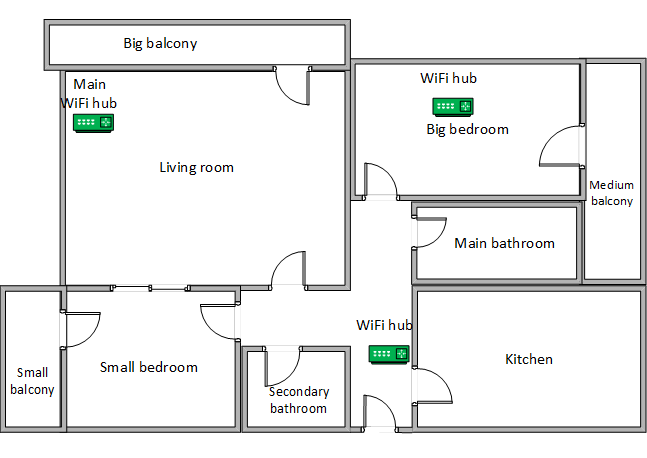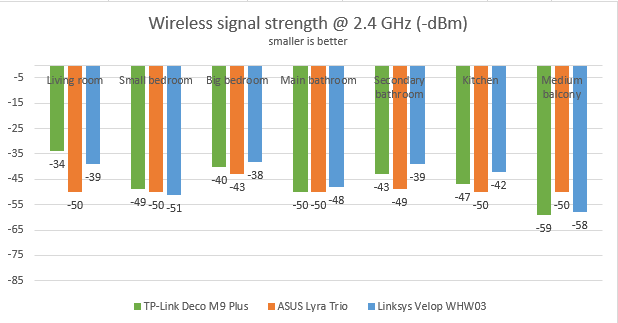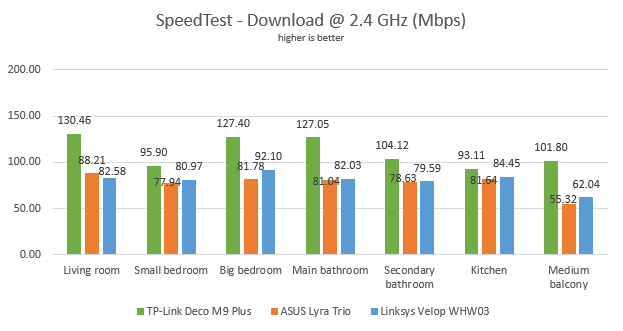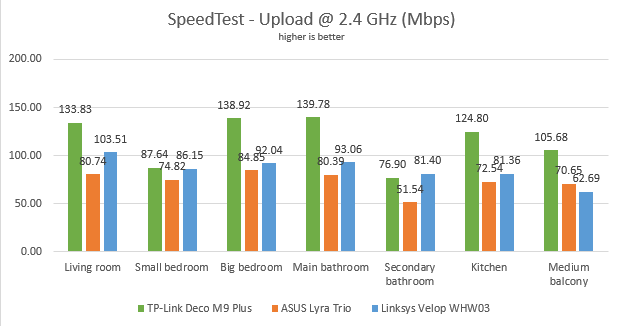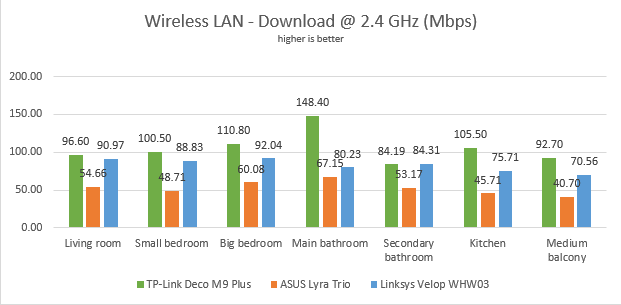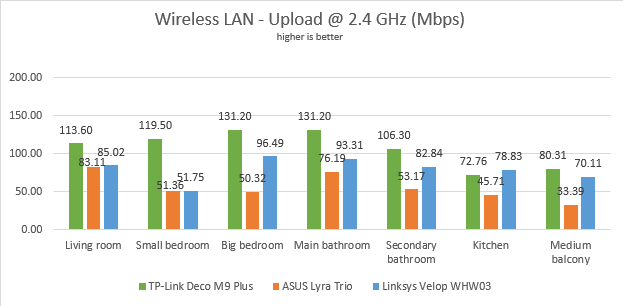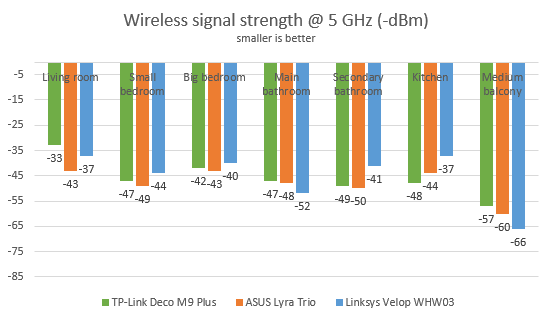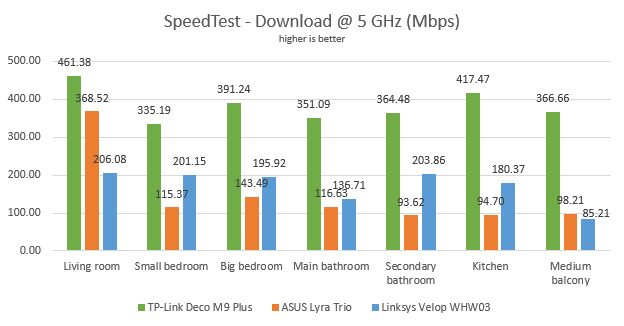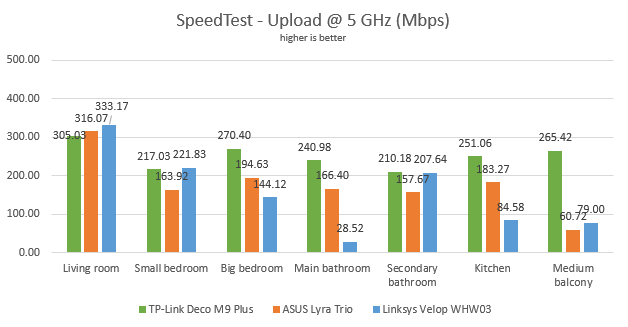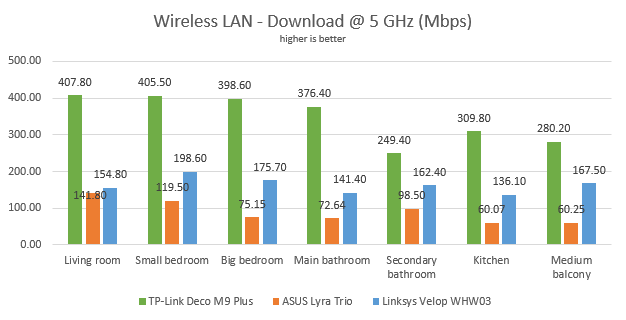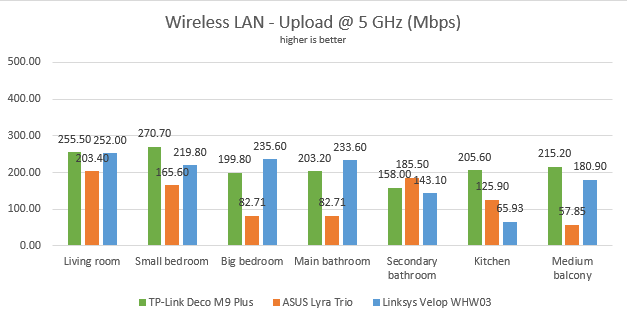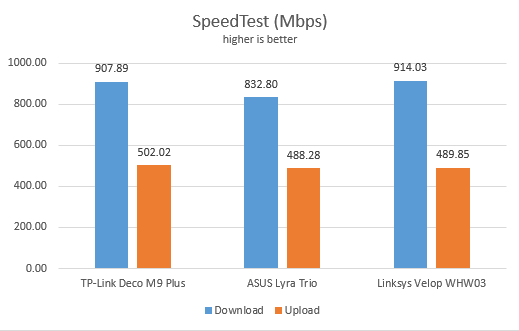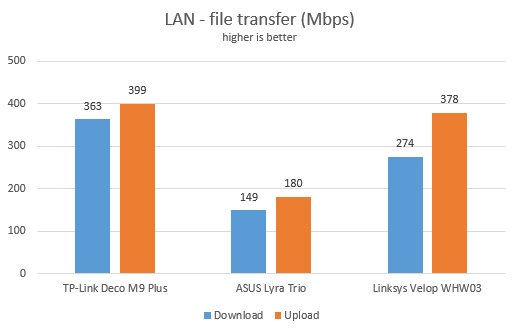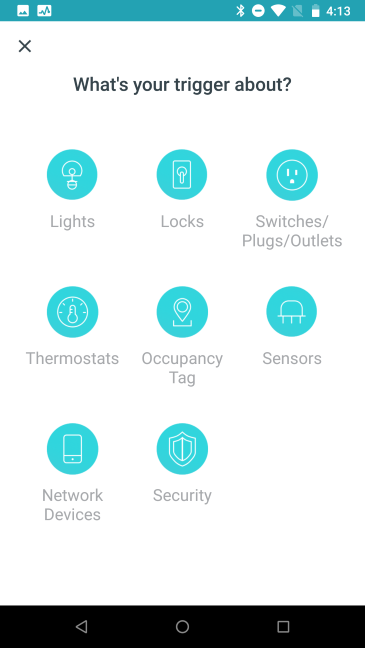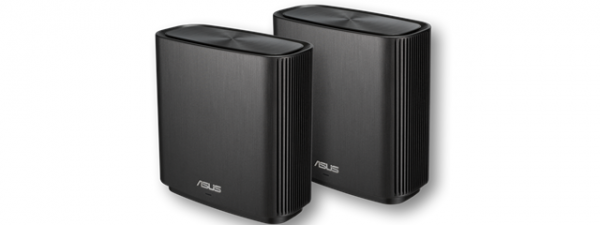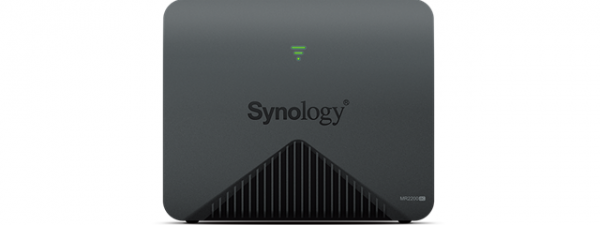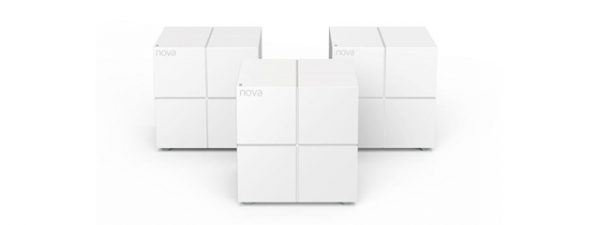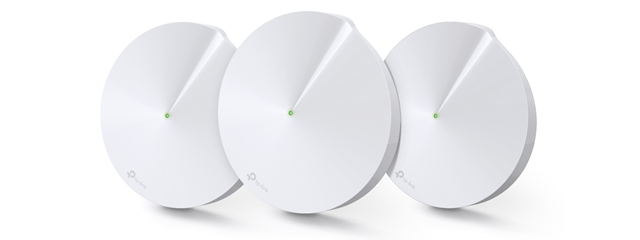
Wireless network performance
First, let's take a look at the apartment that was used in our testing and how it is set up. You can see that the central TP-Link Deco M9 Plus hub is placed in the living room. We placed the second Deco M9 Plus hub in the Big Bedroom. As a result, the Medium balcony should benefit from more stable WiFi. Then, the third Deco M9 Plus was placed near the entrance to the Kitchen, to improve the coverage there too.
Our testing was done using a fast 1 Gigabit Internet connection that is capable of uploads on the internet of up to 500 Mbps. We used an HP Spectre 13 laptop and a Lenovo YogaBook for our measurements. We decided to compare the TP-Link Deco M9 Plus with two competing mesh systems: ASUS Lyra Trio and Linksys Velop AC2200 (WHW03).
We evaluated first the 2.4 GHz wireless network and measured the signal strength offered in each room, using a tool named NetSpot Pro. The signal strength offered by TP-Link Deco M9 Plus was in line with the mesh systems we compared it to.
Then, we used SpeedTest to see how fast the internet connection is when using the 2.4 GHz wireless frequency. TP-Link Deco M9 Plus offered the fastest downloads in all rooms when compared with the other two mesh Wi-Fi systems.
The same was true when we measured the upload speed with SpeedTest.
Continuing our measurements on the 2.4 GHz wireless network, we used the PassMark Performance test to transfer data between two computers connected to the network. This time too, TP-Link Deco M9 Plus had the fastest downloads in our comparison.
Uploads were just as fast with the TP-Link Deco M9 Plus.
Next, we analyzed the performance offered by the 5GHz wireless network. First, we looked at the evolution of the signal strength, from room to room. The signal strength of the TP-Link Deco M9 Plus evolved similarly to that of its competitors.
Next, we ran SpeedTest to see how fast the internet connection is on the 5GHz band. TP-Link Deco M9 Plus crushed the mesh WiFi systems we compared it to when measuring the download speed on this band.
When measuring the upload speed, TP-Link Deco M9 Plus was still the leader, but the differences were not as spectacular.
For the last measurements on the 5GHz wireless band, we used the PassMark Performance test to transfer data between two computers connected to the network. This time too TP-Link Deco M9 Plus offered the fastest downloads.
Uploads were fast too, but the differences were a lot smaller when comparing the TP-Link Deco M9 Plus to other mesh WiFi systems.
TP-Link Deco M9 Plus is very well capable of offering high-speed wireless network coverage, on both bands: 2.4 GHz and 5 GHz.
Wired network performance
To test the quality of the wired Ethernet connection, we used a desktop PC equipped with an AMD Ryzen 5 1600 processor, running at 3.20GHz, 16GB of RAM, a fast Samsung 850 Pro 512GB SSD, and a Lenovo IdeaCentre 610s mini PC.
We measured the speed of the internet connection with a 1 Gbps Ethernet cable, using SpeedTest. TP-Link Deco M9 Plus reached the maximum potential of our internet connection, delivering the speeds you see below.
Then, we ran a network transfer between the two computers, each connected with an Ethernet cable to a different TP-Link Deco M9 Plus. Since the stations were connected wirelessly, the transfer was mediated through WiFi. We used PassMark Performance test for these measurements. Deco M9 Plus delivered solid performance, as you can see below.
TP-Link Deco M9 Plus delivers well performing Ethernet connections that work as advertised.
Extra features
An exciting feature of the TP-Link Deco M9 Plus is the ability to detect and work with smart-home devices like smart bulbs, smart plugs, sensors, smart switches, thermostats, door locks, and outlets from companies like: TP-Link, Philips, GE, Sengled, OSRAM, Nest, Samsung, Kwikset, and others. The list of compatible devices grows over time, and it can be found here: Deco M9 Plus Smart Home Device Compatible List. You can define all kinds of actions to be taken when using smart home devices, based on different types of triggers, which is useful for automating your home.
The setup of smart home devices is not always a simple experience, because Deco M9 Plus may incorrectly classify some devices at first. We recommend checking out TP-Link's collection of setup videos to all smart home users, to avoid any frustration they might encounter.
Other useful features included on the TP-Link Deco M9 Plus are:
- An antivirus module powered by Trend Micro. It filters malicious content, quarantines infected devices, and it also has an intrusion prevention system that is useful in smart homes. This module works well, but the downside is that you have to pay for it after three years of use.
- Cloud-based parental controls that are effective and easy to configure. They are useful for setting time limits, schedules, and protecting your children from inappropriate content online.
- You can set managers for your Deco, through the TP-Link Cloud accounts. For example, in a family, both the husband and the wife can manage the system from their smartphones and tablets.
- Integration with Alexa and IFTTT (If This Then That) - you can remote control the Deco M9 Plus using Alexa and voice commands, and set your automation system.
- TP-Link also bundled an easy to configure QoS feature (Quality of Service), that helps you prioritize network traffic based on its type. For example, you can prioritize streaming over downloading files.
What is your opinion of the TP-Link Deco M9 Plus?
Now you know our opinion about the TP-Link Deco M9 Plus mesh WiFi system, and how it performed in our testing. Before closing this review, share with us your opinion about this mesh WiFi system. Is it something that you would like to purchase? Would it be useful in your home or workplace? Comment below and let's discuss.


 15.03.2019
15.03.2019 